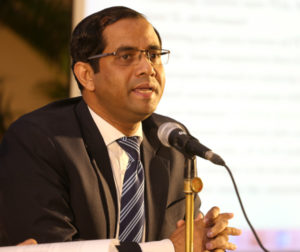Published in The Daily Star on Monday, 11 June 2018
FIVE YEARS OF RANA PLAZA COLLAPSE

On the occasion of the fifth anniversary of Rana Plaza collapse, the roundtable was organised to discuss the current state of the RMG industry, workers’ rights and livelihood in light of the SDGs, factory safety, compensation, rehabilitation, medical treatment, and arbitration of industrial disputes. With the participation of different stakeholders, this discussion seeks to address issues related to prevention of factory accidents; recommendations in light of international and national capacities gained so far; structural initiatives of management and humanitarian assistance in cases of industrial accidents; medical treatment and rehabilitation of injured workers; compensation structures in place; and industrial relations between employers and workers.
Dr Khondaker Golam Moazzem, Research Director, CPD
 One thing to address is the right to form trade unions from both within and outside EPZs. We are hopeful since there is now a directorate in DIFE, and the Department of Labour has been upgraded. Even Fire Service and Civil Defence has improved in terms of logistics and human resource.
One thing to address is the right to form trade unions from both within and outside EPZs. We are hopeful since there is now a directorate in DIFE, and the Department of Labour has been upgraded. Even Fire Service and Civil Defence has improved in terms of logistics and human resource.
It should be noted that there are many factories (around 47 percent) outside of the purview of Accord and Alliance which are also involved in RMG exports. We would urge the BGMEA and BKMEA that the non-members are brought under membership and to construct an institutional framework so that non-members are not allowed to be involved with exports. There is still $2 million in the Rana Plaza Trust Fund and this can be used to help the Rana Plaza victims who were injured and need help with treatment. BGMEA should be more proactive. One positive aspect is the 5 percent yearly increase in wages but even that is not a lot, especially since living costs have risen a lot. We hope that the new wage board will address this issue. The Remediation Coordination Cell should be made operational. The public-private partnership model alongside RCC should be pursued.

